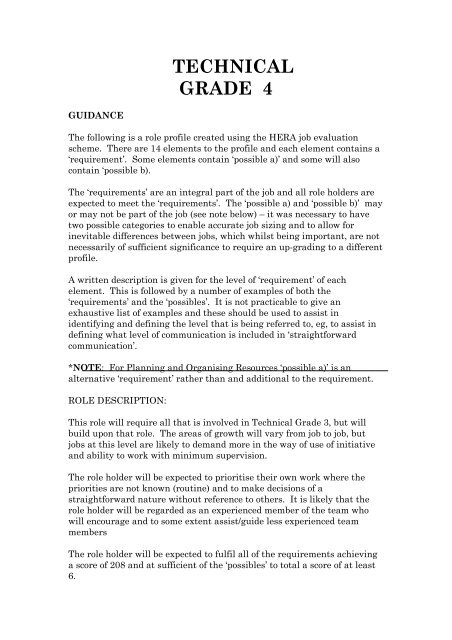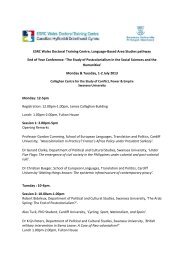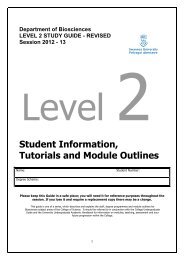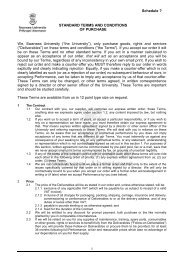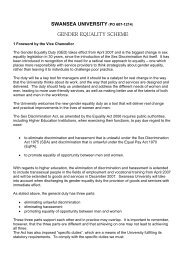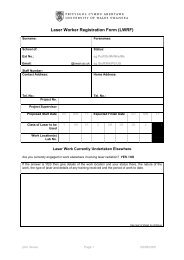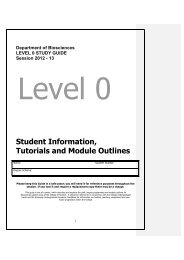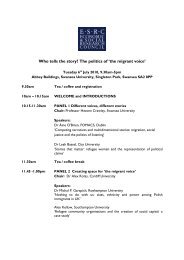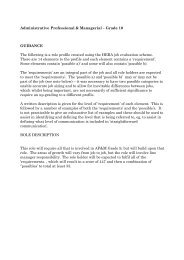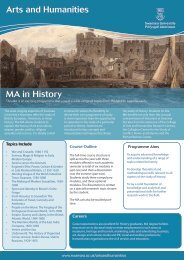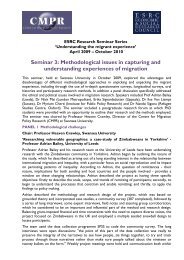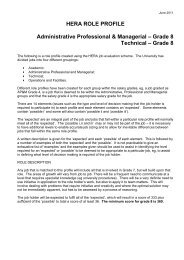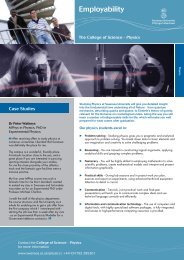TECHNICAL GRADE 4 - Swansea University
TECHNICAL GRADE 4 - Swansea University
TECHNICAL GRADE 4 - Swansea University
Create successful ePaper yourself
Turn your PDF publications into a flip-book with our unique Google optimized e-Paper software.
<strong>TECHNICAL</strong><br />
<strong>GRADE</strong> 4<br />
GUIDANCE<br />
The following is a role profile created using the HERA job evaluation<br />
scheme. There are 14 elements to the profile and each element contains a<br />
‘requirement’. Some elements contain ‘possible a)’ and some will also<br />
contain ‘possible b).<br />
The ‘requirements’ are an integral part of the job and all role holders are<br />
expected to meet the ‘requirements’. The ‘possible a) and ‘possible b)’ may<br />
or may not be part of the job (see note below) – it was necessary to have<br />
two possible categories to enable accurate job sizing and to allow for<br />
inevitable differences between jobs, which whilst being important, are not<br />
necessarily of sufficient significance to require an up-grading to a different<br />
profile.<br />
A written description is given for the level of ‘requirement’ of each<br />
element. This is followed by a number of examples of both the<br />
‘requirements’ and the ‘possibles’. It is not practicable to give an<br />
exhaustive list of examples and these should be used to assist in<br />
identifying and defining the level that is being referred to, eg, to assist in<br />
defining what level of communication is included in ‘straightforward<br />
communication’.<br />
*NOTE: For Planning and Organising Resources ‘possible a)’ is an<br />
alternative ‘requirement’ rather than and additional to the requirement.<br />
ROLE DESCRIPTION:<br />
This role will require all that is involved in Technical Grade 3, but will<br />
build upon that role. The areas of growth will vary from job to job, but<br />
jobs at this level are likely to demand more in the way of use of initiative<br />
and ability to work with minimum supervision.<br />
The role holder will be expected to prioritise their own work where the<br />
priorities are not known (routine) and to make decisions of a<br />
straightforward nature without reference to others. It is likely that the<br />
role holder will be regarded as an experienced member of the team who<br />
will encourage and to some extent assist/guide less experienced team<br />
members<br />
The role holder will be expected to fulfil all of the requirements achieving<br />
a score of 208 and at sufficient of the ‘possibles’ to total a score of at least<br />
6.
COMMUNICATIONS<br />
Oral communication:<br />
Covers communication in both informal and formal situations.<br />
REQUIREMENT: Communicating straightforward information in a clear and<br />
accurate manner will be an integral part of this role and will be required on a daily<br />
basis.<br />
EXAMPLES:<br />
• Explaining the use of straightforward equipment.<br />
• Providing straightforward information to colleagues or others – this may include<br />
information which requires a precise and specialised knowledge relevant to the<br />
area that the role holder is working in.<br />
• Discussing work priorities with a supervisor/line manager.<br />
• Dealing with telephone calls – taking messages.<br />
• Giving/receiving straightforward instructions relating to work systems.<br />
POSSIBLE A) There may also be an occasional (at least monthly, but not daily)<br />
need to communicate information that needs careful explanation or interpretation to<br />
help others understand, taking into account what to communicate and how best to<br />
convey the information to others. Communication that:<br />
(i.) requires considerable consideration as to the format and language used;<br />
and/or;<br />
(ii.) clarifies complicated issues;<br />
and/or<br />
(iii.) employs a range of language over and above that found in standard everyday<br />
usage;<br />
EXAMPLES:<br />
• Explaining matters that are specialist and require the use of language over and<br />
above that found in everyday usage.<br />
• Making presentations involving explanations of specific topics to those who<br />
do not have a high level of familiarity or knowledge of those topics.<br />
• Ordering specialist equipment where there is a need to discuss technical<br />
specifications with the customer and/or the provider.<br />
• Explaining complicated/involved procedures.<br />
• Persuading colleagues to adopt a viewpoint.<br />
• Providing feedback or resolving conflicts where some tact and diplomacy are<br />
required.<br />
• Explaining a report on cost or operational implications of a decision.<br />
• Conducting job (or similar) interviews.<br />
REQUIREMENT ACC 12<br />
POSSIBLE A) ABC +8
Written or electronic communication and visual media:<br />
Covers communication in both informal and formal situations.<br />
REQUIREMENT: The role holder will be expected to deal with the written word<br />
as a constant part of their job. This may be in the form of e/mails, memos, reports,<br />
instructions/manuals or other documents, but will be of a straightforward nature.<br />
EXAMPLES:<br />
• Use of e-mail to provide and receive straightforward information.<br />
• Writing messages, eg telephone messages, for others.<br />
• Following straightforward instructions from colleagues.<br />
• Reading and understanding information/instructions relating to straightforward<br />
equipment/machinery usage.<br />
POSSIBLE A): There may also be an occasional (at least monthly, but not daily)<br />
need to communicate information that needs careful explanation or interpretation to<br />
help others understand, taking into account what to communicate and how best to<br />
convey the information to others. Communication that:<br />
(iv.) requires considerable consideration as to the format, tone and language used;<br />
and/or;<br />
(v.) clarifies complicated issues;<br />
and/or<br />
(vi.) employs a range of language over and above that found in standard everyday<br />
usage;<br />
EXAMPLES<br />
• Providing written information relating to machinery/equipment that requires<br />
the use of specific language over and above that found in everyday usage.<br />
• Drafting short factual reports.<br />
• Providing written instruction on how to use complicated<br />
machinery/equipment that requires careful use of language to convey<br />
technical matters to those who may have little understanding of such issues.<br />
REQUIREMENT ACC 10<br />
POSSIBLE A) ABC +7
PASTORAL CARE AND WELFARE<br />
Covers the welfare and well being of students and staff within the institution, in both<br />
informal and formal situations. This may include the need to be aware of the support<br />
services available; giving supportive advice and guidance; and counselling others on<br />
specific issues.<br />
REQUIREMENT: It is expected that any member of staff of the university will show due<br />
care to colleagues and students, but it is not part of this role to have any specific<br />
responsibility for the pastoral care and welfare of others.<br />
REQUIREMENT BCC 13
TEAM DEVELOPMENT<br />
Covers the development of the skills and knowledge of others in the work team. This<br />
may include the induction of new colleagues; coaching and appraising any individuals<br />
who are supervised, mentored or managed by you; and giving guidance or advice to<br />
one’s peers or supervision on specific aspects of work.<br />
REQUIREMENT: Assistance in training and guiding new members of staff who join the work<br />
team, is likely to be an occasional part of the job.<br />
EXAMPLES<br />
• Showing a new member of staff around the workplace<br />
• Showing a new member of staff any system or procedure that is relevant to the particular<br />
area of work.<br />
POSSIBLE A):<br />
The role holder will also (in addition to the above requirement) be required to either:<br />
(a.) Assist in training and guiding new members of staff who join the work team on a frequent<br />
(at least monthly) basis. (see above for examples).<br />
OR<br />
(b.) Be involved in support/guidance that will be on-going for at least a month.<br />
EXAMPLES<br />
• Teach someone how to use a specialist piece of software.<br />
• Assist someone in learning an involved procedure or system.<br />
REQUIREMENT BCC 14<br />
POSSIBLE A) ACC +9
TEAMWORK AND MOTIVATION<br />
Covers team work and team leadership when working in both internal and external<br />
teams. This may include the need to contribute as an active member of the team;<br />
motivating others in the team; and providing leaderships and direction for the team.<br />
REQUIREMENT: The role holder will generally have easy access to a supervisor/line<br />
manager who will manage and lead the team and involvement in the team will be to be an<br />
active and willing participant, co-operating and working with colleagues.<br />
EXAMPLES:<br />
• Working with colleagues to complete a task.<br />
• Working on a daily basis with colleagues to ensure that standard deadlines are met, eg,<br />
that specialist equipment is set up ready for use by others for a specified day and time.<br />
• Contributing to team discussions, perhaps at a team meeting.<br />
• Assisting a colleague to complete a task to a particular deadline without instruction to do<br />
so – this is in a situation where a colleague is clearly overloaded and struggling with a<br />
particular situation or on a particularly busy day.<br />
There will be some requirement to work in a self-directed manner and co-operate, support<br />
and encourage colleagues without the need for instruction to do so. Have constant<br />
involvement in team matters, giving guidance and support to less experienced members of<br />
the team.<br />
EXAMPLES:<br />
Some element of identifying what is urgent and ensuring that it is dealt with as a priority, or<br />
project management where it is necessary to identify the correct order of work and allocate<br />
work to colleagues, who the role holder does not line manage.<br />
REQUIREMENT ABDDD 9
SERVICE DELIVERY<br />
REQUIREMENT: The role holder is likely to be responsible for providing a service,<br />
where the standard and requirements of the service will be clearly established by others.<br />
The role holder may be required to ascertain straightforward facts or information in order<br />
to provide the required service.<br />
• Responding to a request for information or assistance.<br />
• Contributing to the role holder’s area/section/department providing an efficient and<br />
effective service – this may involve ascertaining the requirements of an individual in<br />
relation to a particular activity or task.<br />
• Contributing to team meetings and discussions with ideas that will improve the<br />
efficiency of the area or work or resolve particular problems that are arising.<br />
EXAMPLES:<br />
• Ascertaining what audio visual equipment is required by a user – establishing what<br />
they want to do and advising as to the right equipment for the situation.<br />
• Ascertaining what equipment needs to be set up ready for an experiment to be<br />
conducted.<br />
REQUIREMENT: ADD 20
PLANNING AND ORGANISING RESOURCES<br />
Covers organising, prioritising and planning time and resources, be they human,<br />
physical or financial. This may include planning and organising one’s own work;<br />
planning work for others on day-to-day basis, planning individual tasks or projects;<br />
carrying out operational planning; and planning for the coming years.<br />
REQUIREMENT: In the main role holder will work to a given plan.<br />
EXAMPLES:<br />
• Organising a meeting – checking others’ availability and booking rooms/equipment.<br />
• Ensuring that deadlines are met, eg, ensuring that equipment is set up in order for an<br />
experiment to be conducted at a particular time.<br />
*There will also be some need, although this will not be a predominant requirement, to deal<br />
with tasks, which, whilst they may be standard and frequently occurring, are not routine. A<br />
need to plan, prioritise and organise own work or resources to achieve agreed objectives.<br />
This will include dealing with activities/enquiries/incidents, as and when they arise, without<br />
constant reference to a line manager or supervisor.<br />
EXAMPLES:<br />
• Recognising work that is urgent and needs to be prioritised.<br />
• Decide when and how to respond to requests for information or assistance<br />
• Decide when to order replacement stock<br />
• Ensuring that deadlines are met.<br />
• Ensuring that data is input into a data system in a timely fashion.<br />
• Ensuring that other systems and procedures are carried out, as and when required.<br />
POSSIBLE A)<br />
The role holder may be required to work at the standards indicated above (from the point of<br />
the asterisk) on a daily basis and as a predominant part of the job.<br />
REQUIREMENT ABDDD 9<br />
POSSIBLE A) DADDD +11
INITIATIVE AND PROBLEM SOLVING<br />
Covers identifying or developing options and selecting solutions to problems, which<br />
occur in the role. This may include using initiative to select from available options;<br />
resolving problems where an immediate solution may not be apparent; dealing with<br />
complex problems; and anticipating problems which could have major repercussions.<br />
REQUIREMENT: There will be a need to solve standard day-to-day problems. These<br />
will be straightforward problems with limited options and/or frequently occurring<br />
problems where the solution is known.<br />
The role holder will be required to use initiative to resolve everyday situations where the<br />
consequence of any action taken will be limited.<br />
• Using initiative to make suggestions to others on how to deal with a situation which is<br />
clearly causing a problem within a work area.<br />
• Dealing with someone who is being a little difficult or making a complaint.<br />
• Dealing with a piece of machinery that is not working. Ascertaining whether it is a<br />
problem that can be easily solved or something that requires summoning assistance.<br />
POSSIBLE A): There may, from time to time – perhaps when standing in for a colleague<br />
- be some need, to resolve problems that are predictable but do not occur very frequently.<br />
The range of choices is defined, for example, by a set of procedures or guidelines or by<br />
training and application of knowledge.<br />
EXAMPLES<br />
• Ascertaining why an IT system has failed and establishing a remedy.<br />
• Advising a line manager that colleagues are not happy with audio visual equipment<br />
that the team is providing, because it is difficult to use and suggesting an<br />
alternative.<br />
• Advising a colleague (who has responsibility for the labs) that difficult situations<br />
are arising in the lab because groups of students are arriving at the same time<br />
wanting to use equipment that is in limited supply and suggesting that students<br />
should be required to book equipment to avoid stress and disagreement.<br />
REQUIREMENT ADDD 8<br />
POSSIBLE A) ACDD +1
ANALYSIS AND RESEARCH<br />
Covers investigating issues, analysing information and carrying out research. This<br />
may include following standard procedures to gather and analyse data; identifying and<br />
designing appropriate methods of research; collating and analysing a range of data<br />
from different sources; and establishing new methods or models for research, setting<br />
the context for research.<br />
REQUIREMENT: The role holder will be expected to establish the basic facts in<br />
situations, which require further investigation, and inform others if necessary.<br />
EXAMPLES:<br />
• Establish what audio visual equipment is required for a presentation.<br />
• Establish what equipment is required for an experiment.<br />
• Establish why a piece of equipment is not working – is it a problem that is easily<br />
solved or will require an expert.<br />
POSSIBLE A): There may be a need to gather data from a variety of sources. At<br />
this grade this will be important, but not predominant.<br />
• Keep particular data on a data/spreadsheet to provide others with information,<br />
eg, monitoring resource usage. This will involve some understanding of the<br />
data and how to manipulate it in order to provide certain specified information.<br />
• Seek information out from a variety of sources as per the requests of others, eg,<br />
conducting a web search for some specified information.<br />
REQUIREMENT ADDDD 7<br />
POSSIBLE A) ABDDD +2
WORK ENVIRONMENT<br />
Covers the impact the working environment has on you and your ability to respond to<br />
and control the environment safely. This may include such things as the temperature,<br />
noise or fumes, the work position and working in an outdoor environment.<br />
REQUIREMENT: The role holder will generally work in a stable environment, eg<br />
an office.<br />
POSSIBLE A) The role holder may have some (this will be important, but not<br />
predominant) responsibility for managing the impact of the environment on the work<br />
or safety of other people where normally the degree of risk or level of hazard is<br />
obvious.<br />
EXAMPLE:<br />
o Setting up equipment for self or others to use, ensuring that this<br />
complies with general health and safety standards.<br />
o Working in a laboratory / workshop using potentially hazardous<br />
equipment<br />
REQUIREMENT: ACC 19<br />
POSSIBLE A) ABC 4
LIAISON AND NETWORKING<br />
Covers liaising with others both within and outside the institution and creating<br />
networks of useful contacts. This may include passing on information promptly to<br />
colleagues; ensuring mutual exchange of information; influencing developments<br />
through one’s contacts; and building an external reputation.<br />
REQUIREMENT: There is no requirement for the role holder to have contact with<br />
people outside of their work team.<br />
POSSIBLE A): It is highly likely that the role holder will liaise with persons outside of<br />
their work team. This will be for the purpose of passing on information promptly to<br />
ensure that work is done effectively.<br />
EXAMPLES:<br />
Contact with others (must be people from outside of the work team, for work related<br />
reasons)– this could be any information, who it needs to be passed to and when will be<br />
established by others or by routine/practice, eg, a member of staff in Personnel ringing a<br />
member of staff in Finance, every Friday, to tell them how many leavers there are.<br />
Networking is not an expected requirement at this grade<br />
REQUIREMENT: EEEE 7<br />
POSSIBLE A): DEEE +1<br />
DEFINITIONS:<br />
LIAISON – contact with persons outside of the role holder’s work team, with the aim<br />
of imparting or receiving specific information.<br />
NETWORKING – contact with persons outside of the role holder’s work team for<br />
the purposes of share information/knowledge/best practice within a field/area of<br />
work/specialism for the benefit of the job.
DECISION MAKING<br />
Covers the impact of decisions within the institution and externally. This may include<br />
decisions which impact on one’s own work or team; decisions which impact across<br />
the institution; and decisions which could have significant impact on the longer term<br />
within or outside the institution.<br />
REQUIREMENT: The role holder will be involved in decision making of a<br />
straightforward nature, that is, that which can easily be amended and have little<br />
effect beyond the immediate area of work. At this grade such decisions will be made<br />
independently and there will be an expectation that the role holder will assist less<br />
experienced colleagues with decision making at this level.<br />
EXAMPLES:<br />
• Deciding when to hold a meeting.<br />
• Spending petty cash, or buying low cost items within a local budget.<br />
• Choosing stock from a preferred supplier’s list, perhaps to recommend to a<br />
colleague.<br />
• Deciding whether to deal with a complaint or refer it on to someone else.<br />
• Deciding whether or not a specialist is required when a piece of machinery is<br />
not working.<br />
REQUIREMENT: DDE 17
TEACHING AND LEARNING SUPPORT<br />
Covers the development of the skills and knowledge of students and others who are<br />
not part of the work team. This may include providing instruction to students or<br />
others when they are first using a particular service or working in a particular area;<br />
carrying out standard training; and the assessment and teaching of students.<br />
REQUIREMENT:<br />
Teaching those outside of the work team is not part of this role<br />
POSSIBLE A) It is possible that the role holder will occasionally be involved in<br />
straightforward demonstrations or explanations given on a routine basis.<br />
EXAMPLES:<br />
• Explaining straightforward procedures such as how to use a piece of equipment.<br />
• How to set up a straightforward experiment.<br />
REQUIREMENT DDDD 10<br />
POSSIBLE A) CDDD +2
SENSORY AND PHYSICAL DEMANDS<br />
Covers the sensory and physical aspects of the role required to complete tasks. This<br />
may include physical effort, co-ordination and dexterity; using aural evidence to<br />
assess next actions; applying skilled techniques and co-ordinating sensory<br />
information; and high levels of dexterity where precision or accuracy is essential.<br />
REQUIREMENT: The use of a computer for more than 50% of work time or that<br />
some use is made of a variety of software over and above e-mail, or that the role<br />
holder will be a proficient typist who is expected to produce accurate and presentable<br />
letters, documents and reports at a quick speed.<br />
EXAMPLES:<br />
• Learn to use a specialist tool or piece of equipment (eg, microscope, test rig<br />
or printing) and use it effectively.<br />
• Use audio-visual and other presentational equipment.<br />
• Using a fairly complicated (something that requires considerable usage and<br />
training to become a proficient user) piece of software that is specific to an<br />
area of work.<br />
REQUIREMENT: C 18
KNOWLEDGE AND EXPERIENCE<br />
Covers the relevant knowledge needed to carry out the role, however, acquired,<br />
whether this is technical, professional or specialist. This may include the need for<br />
sufficient experience to carry out basic, day-to-day, responsibilities; the need for a<br />
breadth or depth of experience to act as a point of reference for others; and the need to<br />
act as a leading authority in one’s field or discipline.<br />
REQUIREMENT: At this grade the role holder will be expected to have some<br />
knowledge of professional or technical practice. S/he will be expected to undertake<br />
practical or theoretical training leading to a certificate and to undergo periodic<br />
refresher and up-dating training,<br />
EXAMPLES:<br />
• Know how to program a computer.<br />
• Be able to interpret rules, procedures and regulations and provide advice to<br />
others on how they should be applied.<br />
• Basic management skills<br />
REQUIREMENT D 35


